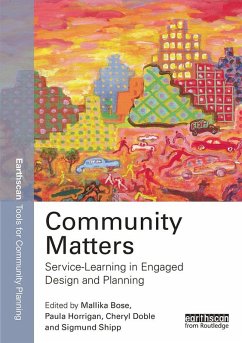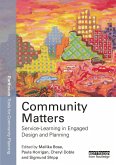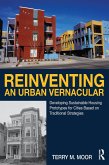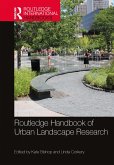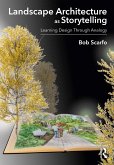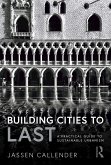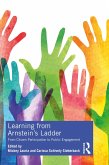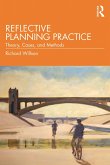Community Matters: Service-Learning in Engaged Design and Planning (eBook, ePUB)
Redaktion: Bose, Mallika; Shipp, Sigmund C.; Doble, Cheryl; Horrigan, Paula
59,95 €
59,95 €
inkl. MwSt.
Sofort per Download lieferbar

30 °P sammeln
59,95 €
Als Download kaufen

59,95 €
inkl. MwSt.
Sofort per Download lieferbar

30 °P sammeln
Jetzt verschenken
Alle Infos zum eBook verschenken
59,95 €
inkl. MwSt.
Sofort per Download lieferbar
Alle Infos zum eBook verschenken

30 °P sammeln
Community Matters: Service-Learning in Engaged Design and Planning (eBook, ePUB)
Redaktion: Bose, Mallika; Shipp, Sigmund C.; Doble, Cheryl; Horrigan, Paula
- Format: ePub
- Merkliste
- Auf die Merkliste
- Bewerten Bewerten
- Teilen
- Produkt teilen
- Produkterinnerung
- Produkterinnerung

Bitte loggen Sie sich zunächst in Ihr Kundenkonto ein oder registrieren Sie sich bei
bücher.de, um das eBook-Abo tolino select nutzen zu können.
Hier können Sie sich einloggen
Hier können Sie sich einloggen
Sie sind bereits eingeloggt. Klicken Sie auf 2. tolino select Abo, um fortzufahren.

Bitte loggen Sie sich zunächst in Ihr Kundenkonto ein oder registrieren Sie sich bei bücher.de, um das eBook-Abo tolino select nutzen zu können.
Shows how and why engaged research and participatory learning methods should be adpoted in design and planning education
- Geräte: eReader
- mit Kopierschutz
- eBook Hilfe
- Größe: 4.35MB
Andere Kunden interessierten sich auch für
![Community Matters: Service-Learning in Engaged Design and Planning (eBook, PDF) Community Matters: Service-Learning in Engaged Design and Planning (eBook, PDF)]() Community Matters: Service-Learning in Engaged Design and Planning (eBook, PDF)59,95 €
Community Matters: Service-Learning in Engaged Design and Planning (eBook, PDF)59,95 €![Reinventing an Urban Vernacular (eBook, ePUB) Reinventing an Urban Vernacular (eBook, ePUB)]() Terry MoorReinventing an Urban Vernacular (eBook, ePUB)63,95 €
Terry MoorReinventing an Urban Vernacular (eBook, ePUB)63,95 €![Routledge Handbook of Urban Landscape Research (eBook, ePUB) Routledge Handbook of Urban Landscape Research (eBook, ePUB)]() Routledge Handbook of Urban Landscape Research (eBook, ePUB)45,95 €
Routledge Handbook of Urban Landscape Research (eBook, ePUB)45,95 €![Landscape Architecture as Storytelling (eBook, ePUB) Landscape Architecture as Storytelling (eBook, ePUB)]() Bob ScarfoLandscape Architecture as Storytelling (eBook, ePUB)35,95 €
Bob ScarfoLandscape Architecture as Storytelling (eBook, ePUB)35,95 €![Building Cities to LAST (eBook, ePUB) Building Cities to LAST (eBook, ePUB)]() Jassen CallenderBuilding Cities to LAST (eBook, ePUB)34,95 €
Jassen CallenderBuilding Cities to LAST (eBook, ePUB)34,95 €![Learning from Arnstein's Ladder (eBook, ePUB) Learning from Arnstein's Ladder (eBook, ePUB)]() Learning from Arnstein's Ladder (eBook, ePUB)39,95 €
Learning from Arnstein's Ladder (eBook, ePUB)39,95 €![Reflective Planning Practice (eBook, ePUB) Reflective Planning Practice (eBook, ePUB)]() Richard WillsonReflective Planning Practice (eBook, ePUB)35,95 €
Richard WillsonReflective Planning Practice (eBook, ePUB)35,95 €-
-
-
Shows how and why engaged research and participatory learning methods should be adpoted in design and planning education
Hinweis: Dieser Artikel kann nur an eine deutsche Lieferadresse ausgeliefert werden.
Dieser Download kann aus rechtlichen Gründen nur mit Rechnungsadresse in A, B, BG, CY, CZ, D, DK, EW, E, FIN, F, GR, HR, H, IRL, I, LT, L, LR, M, NL, PL, P, R, S, SLO, SK ausgeliefert werden.
Hinweis: Dieser Artikel kann nur an eine deutsche Lieferadresse ausgeliefert werden.
Produktdetails
- Produktdetails
- Verlag: Taylor & Francis eBooks
- Seitenzahl: 376
- Erscheinungstermin: 9. Mai 2014
- Englisch
- ISBN-13: 9781317907756
- Artikelnr.: 40883592
- Verlag: Taylor & Francis eBooks
- Seitenzahl: 376
- Erscheinungstermin: 9. Mai 2014
- Englisch
- ISBN-13: 9781317907756
- Artikelnr.: 40883592
- Herstellerkennzeichnung Die Herstellerinformationen sind derzeit nicht verfügbar.
Mallika Bose is Associate Professor of landscape architecture at Penn State University, USA. She was the Director of the Hamer Center for Community Design from 2008 to 2012. Motivated by her interest in issues of equity/justice and how social structures are spatially embedded, she pursues research on built environment and active living/healthy eating, public scholarship and community-engaged design and planning. Paula Horrigan is Associate Professor of landscape architecture at Cornell University, USA. Her teaching and research focus on placemaking, participatory design, and the pedagogies and practices of civic engagement that encourage university-community reciprocity and enable community-based problem solving. She leads the Rust to Green NY Action Research Project whereby university and community partners work together on fostering a narrative of resilience and sustainability in New York's Rust Belt. Cheryl Doble is Associate Professor Emeritus in the department of landscape architecture at SUNY College of Environmental Science and Forestry in Syracuse, New York, USA. She is the founding director of the college's Center for Community Design Research, which facilitates the development of academic/community partnerships that support collaborative community-based design and research projects. Sigmund C. Shipp is Associate Professor in the department of urban affairs and planning at Hunter College, New York, USA. He is the director of the undergraduate urban studies program. His research has involved a study of urban renewal, worker-owned cooperatives, and the Black church and college community development corporations. His recent research has focused on White poverty in America.
Introduction: Why Community Matters 1. Taking Stock: Perspectives on
Community Matters Part 1: Partnering to Advance Productive Community
Dialogues 2. Partnering, Because Community Matters 3. Establishing a Place
for Common Ground: A Case Study of the Role of a Service-Learning Studio in
Neighborhood University Development 4. Spaces of Connection: Implementing
the Design of a High-Tech Learning Space for Youth Part 2: Original Seeing:
Beholding Community 5. Recalling and Remembering Community: Cell Phone
Diaries 6. Considering Public History 7. Finding and Reassembling Community
Amidst Disaster Part 3: Co-Imagining Alternative Worlds 8. Clearwater
Studio: Co-imagining a Living Past and a Common Future 9. The Politics of
Radical Pedagogy: Transforming Power and Seeking Justice 10. Rust to Green:
Cultivating Resilience in the Rust Belt Part 4: Changing from Within:
Recasting Academic Communities 11. Democracy Matters, Beginning in the
Classroom: Towards a Collaborative (Democratic?) Design Studio 12. Changing
Racial Attitudes: Community-based Learning and Service in East St. Louis,
Illinois 13. Putting Community First: Reflections on History, Identity, and
Power in Local and Global Service-Learning Part 5: Outcomes Matter:
Creating an Evaluative Community 14. Reaching Out and Reaching In:
Investigating Community Impact of a University Outreach Program 15. Probing
Impacts: Voices of Community 16. The Semester Ends but the Community
Challenges Do Not: A Legacy to Continue the Work in East Harlem 17. Life
Before/During/Between/After the Service-learning Design Studios
Bibliography
Community Matters Part 1: Partnering to Advance Productive Community
Dialogues 2. Partnering, Because Community Matters 3. Establishing a Place
for Common Ground: A Case Study of the Role of a Service-Learning Studio in
Neighborhood University Development 4. Spaces of Connection: Implementing
the Design of a High-Tech Learning Space for Youth Part 2: Original Seeing:
Beholding Community 5. Recalling and Remembering Community: Cell Phone
Diaries 6. Considering Public History 7. Finding and Reassembling Community
Amidst Disaster Part 3: Co-Imagining Alternative Worlds 8. Clearwater
Studio: Co-imagining a Living Past and a Common Future 9. The Politics of
Radical Pedagogy: Transforming Power and Seeking Justice 10. Rust to Green:
Cultivating Resilience in the Rust Belt Part 4: Changing from Within:
Recasting Academic Communities 11. Democracy Matters, Beginning in the
Classroom: Towards a Collaborative (Democratic?) Design Studio 12. Changing
Racial Attitudes: Community-based Learning and Service in East St. Louis,
Illinois 13. Putting Community First: Reflections on History, Identity, and
Power in Local and Global Service-Learning Part 5: Outcomes Matter:
Creating an Evaluative Community 14. Reaching Out and Reaching In:
Investigating Community Impact of a University Outreach Program 15. Probing
Impacts: Voices of Community 16. The Semester Ends but the Community
Challenges Do Not: A Legacy to Continue the Work in East Harlem 17. Life
Before/During/Between/After the Service-learning Design Studios
Bibliography
Introduction: Why Community Matters 1. Taking Stock: Perspectives on
Community Matters Part 1: Partnering to Advance Productive Community
Dialogues 2. Partnering, Because Community Matters 3. Establishing a Place
for Common Ground: A Case Study of the Role of a Service-Learning Studio in
Neighborhood University Development 4. Spaces of Connection: Implementing
the Design of a High-Tech Learning Space for Youth Part 2: Original Seeing:
Beholding Community 5. Recalling and Remembering Community: Cell Phone
Diaries 6. Considering Public History 7. Finding and Reassembling Community
Amidst Disaster Part 3: Co-Imagining Alternative Worlds 8. Clearwater
Studio: Co-imagining a Living Past and a Common Future 9. The Politics of
Radical Pedagogy: Transforming Power and Seeking Justice 10. Rust to Green:
Cultivating Resilience in the Rust Belt Part 4: Changing from Within:
Recasting Academic Communities 11. Democracy Matters, Beginning in the
Classroom: Towards a Collaborative (Democratic?) Design Studio 12. Changing
Racial Attitudes: Community-based Learning and Service in East St. Louis,
Illinois 13. Putting Community First: Reflections on History, Identity, and
Power in Local and Global Service-Learning Part 5: Outcomes Matter:
Creating an Evaluative Community 14. Reaching Out and Reaching In:
Investigating Community Impact of a University Outreach Program 15. Probing
Impacts: Voices of Community 16. The Semester Ends but the Community
Challenges Do Not: A Legacy to Continue the Work in East Harlem 17. Life
Before/During/Between/After the Service-learning Design Studios
Bibliography
Community Matters Part 1: Partnering to Advance Productive Community
Dialogues 2. Partnering, Because Community Matters 3. Establishing a Place
for Common Ground: A Case Study of the Role of a Service-Learning Studio in
Neighborhood University Development 4. Spaces of Connection: Implementing
the Design of a High-Tech Learning Space for Youth Part 2: Original Seeing:
Beholding Community 5. Recalling and Remembering Community: Cell Phone
Diaries 6. Considering Public History 7. Finding and Reassembling Community
Amidst Disaster Part 3: Co-Imagining Alternative Worlds 8. Clearwater
Studio: Co-imagining a Living Past and a Common Future 9. The Politics of
Radical Pedagogy: Transforming Power and Seeking Justice 10. Rust to Green:
Cultivating Resilience in the Rust Belt Part 4: Changing from Within:
Recasting Academic Communities 11. Democracy Matters, Beginning in the
Classroom: Towards a Collaborative (Democratic?) Design Studio 12. Changing
Racial Attitudes: Community-based Learning and Service in East St. Louis,
Illinois 13. Putting Community First: Reflections on History, Identity, and
Power in Local and Global Service-Learning Part 5: Outcomes Matter:
Creating an Evaluative Community 14. Reaching Out and Reaching In:
Investigating Community Impact of a University Outreach Program 15. Probing
Impacts: Voices of Community 16. The Semester Ends but the Community
Challenges Do Not: A Legacy to Continue the Work in East Harlem 17. Life
Before/During/Between/After the Service-learning Design Studios
Bibliography
